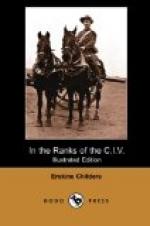July 25.—Wednesday.—Reveille at six. Started at 8.30, at the outset crossing a very awkward drift. It was a sort of full dress crossing, so to speak, when all the officers collect and watch the passage. We dived down a little chasm, charged through a river, and galloped up the side of a wall. One waggon stuck, and we had to lend it our leaders. There was a strong, cold wind, and we kept on our cloaks all day; a bright sun, though, in which I thought the brigade made a very pretty spectacle in its advance, with long streamers of mounted troops and extended infantry on either flank. About one, our section was ordered to march back some miles and meet the rearguard. On the way we passed Hunter and his staff, and his whole brigade, followed by miles of waggons, which we halted to allow to pass, and then followed. They might have discovered they wanted the rearguard strengthening a little sooner, for the road was very bad, and our horses had a hard job. The united brigades camped at sunset. Rumours rife, and one, that De Wet has cut the line near Kroonstadt, seems really true. Very cold.
July 26.—Reveille at 6.30. We waited for orders all the morning, with the horses hooked in ready. While sitting by my team I had my hair cut by a Munster, and an excruciating shave. Rumour is that the Boers have been given till two to surrender. Rumour that they have surrendered. Stated as a fact. Rumour reduced to story that the town of Fouriesberg (five miles on) has surrendered. Anyway, some British prisoners have escaped and come in. Grazing in harness for the rest of the day.
July 27.—Reveille at 5.15. Hooked in and waited for the whole convoy to file by, as we are to be rearguard. It took several hours, and must be five or six miles long. It was a heavy, misty day, and some rain fell. Started at last and marched up the valley, which narrowed considerably here, under the shadow of beetling cliffs, for about eight miles, with incessant momentary halts, as always happens in the rear of a column. Suddenly the valley opened out to another noble circle bounded by mountains on all sides, some wearing a sprinkling of snow still. Here we came to the pretty little town of Fouriesberg, and joined the general camp, which stretched as far as you could see, thousands of beasts grazing between the various lines, and interminable rows of outspanned waggons. At night camp fires twinkled far into the distance, and signals kept flashing from high peaks all round. An officer has been telling us the situation, which is that the trap is closed, the Boers being surrounded on all sides; that they are expected to surrender; that it will be a Paardeberg on a bigger scale—the biggest haul of prisoners in the war.
Some commandeered ham was served out, and we fried ours over the cook’s fire with great success. I may say that the service mess-tin is our one cooking utensil, and the work it stands is amazing; it is a flat round tin with a handle and a lid. It is used indiscriminately for boiling, frying, and baking, besides its normal purpose of holding rations.




